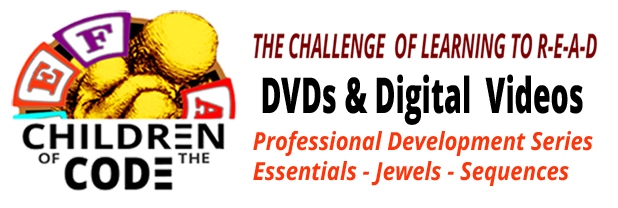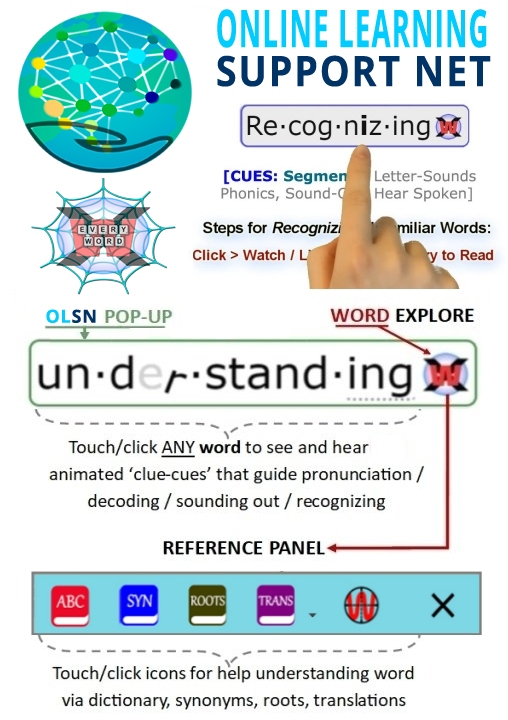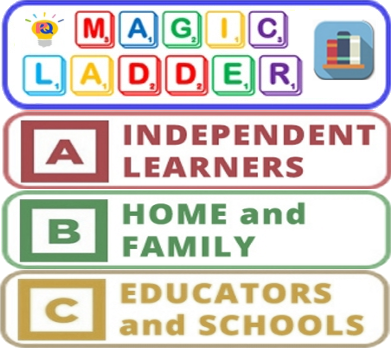National Consequences
Note: Remember to click on any word on this page to experience the next evolutionary step in technology supported reading.
Importance of Reading in Today's Society
Learning to read may not have been as critical in another era, in another time, but in today’s society, where we have moved largely from a manufacturing economy to a service economy, it requires a higher level of literacy than we previously experienced. So, when people bemoan that we’re not teaching children to read and that children are doing worse than before, there is some data to indicate that actually the levels of achievement in reading haven’t changed that much.
But what has changed is our world and so to take advantage of the goods of our current society, literacy is a must. Without it you are relegated to a level of income and opportunity that isn’t fair. The whole purpose of public education is to create more of an equal playing field so that everyone experiences those same opportunities. If we know aprori that it’s requisite to become successful you have to be literate in our society then it’s incumbent upon us to do a better job of helping children at these beginning stages and through out. So, for a society there’s deep consequences for all of us in not having a literate society.
Anne Cunningham, Director of the Joint Doctoral Program in Special Education with the Graduate School of Education at the University of California-Berkeley. Source: COTC Interview – http://www.childrenofthecode.org/interviews/cunningham.htm#ImportanceofReading
Reading Crisis is Connected to an Economic Crisis
There is a reading crisis and the reading crisis leads to an education crisis, and also is certainly connected to an economic crisis as you look at job formation. Do we have people coming through the school system who can really perform the job functions that American business has to have? The answer to that now is clearly no. The schools are not producing.
James Wendorf, Executive Director, National Center for Learning Disabilities. Source: COTC Interview – http://www.childrenofthecode.org/interviews/wendorf.htm#ReadingistheGatewaySkill
The Cost of Our Nation’s Reading Difficulties
David Boulton: Going on a broader, macro level – what does our population’s reading difficulties cost our nation? I’m not looking for precision, I’m looking for magnitudes of order. Economically, in terms of our global economic competition and in terms of the intelligence of our population and what that means about the security of our nation over the longer view.
Dr. Grover (Russ) Whitehurst: It is impossible to quantify the cost associated with reading failure or the advantages that flow to societies whose citizens are highly literate, who read well and read deeply and widely. It is clear, however, particularly in the context of a global economy, that increasingly the competitors of the United States, economic competitors, competitors in terms of ideas and philosophies, are competing in a way that undermines the ability of citizens in the United States to perform well based on the types of skills that involve lifting and pushing and using muscles. They are skills that depend increasingly on high levels of education. And even within high levels of education, the effects of global markets are that its only value added by special types of education, including high levels of literacy, that ultimately are going to allow us to compete well.
Software jobs that pay sixty dollars an hour in the United States are now done for six dollars an hour in India. For our citizens to compete, they have to bring to the software business a higher level of value. That value comes from the ability to conceptualize problems, to come up with novel solutions, to be creative, to think about how to market, speak to the world, speak to citizens of the United States, and all of those abilities flow from the understanding of a culture and oneself and other people that depends on reading.
David Boulton: So, as we said, reading is profoundly connected to this meta-linguistic verbal intelligence, and what makes us competitive is this innovative intelligence.
Dr. Grover (Russ) Whitehurst: Yes, absolutely. Innovative intelligence is a type of verbal intelligence. Verbal intelligence flows, depends on, and has a foundation in reading.
Grover (Russ) Whitehurst, Ex-Director (2002-08), Institute of Education Sciences, U.S. Department of Education. Source: COTC Interview: http://www.childrenofthecode.org/interviews/whitehurst.htm#CostofReading
2000 Florida Election & Reading Difficulty
Dr. Timothy Shanahan: One aspect of this that I had personal experience with was one of the newspapers asked me to analyze the votes in the 2000 Florida election. Obviously, media attention was directed to the hanging chads and the failure of the machines to record people’s votes. The thing that is interesting is that in Florida there are probably more counties that are using paper ballots than machine ballots. One of the newspapers said let’s look at the paper ballots and see how we did there. Florida lost even more votes with paper ballots than machine ballots, and they lost these votes primarily because people couldn’t make sense of the directions.
Florida lost lots of votes because many citizens couldn’t do the simple reading tasks on the ballot. They would spoil their vote by voting multiple times for different candidates. Even this basic franchise of whether you get to cast a vote is connected to literacy. You’re less likely to go and try to vote, but if you do try, you’re more likely to fail and your vote will be lost. We’re almost fifty years beyond the Supreme Court saying there wouldn’t be any kind of a literacy bar to vote in this country.
David Boulton: Of course there’s going to be. Even if you get around the instrumental simple part of it, you’ve got the deeper issue of whether somebody is a competent participant.
Dr. Timothy Shanahan: Yes. In fact, one interesting analysis done with adults who are low in literacy is that low literacy individuals are less likely to read a newspaper than a high literate person. But, of course, these folks could still participate by getting information from television and have radio. There’s absolutely no reason why a low literacy person wouldn’t be able to access a lot of the information that is available over those media.
Except it turns out that lack of literacy has an isolating effect. What happens is low literacy people are less likely to watch informational shows on television, they’re less likely to watch news, for example, than other kinds of television.
David Boulton: How can they navigate?
Dr. Timothy Shanahan: Exactly. They just don’t pay attention to stuff like that which means, they miss out on information about the candidates and elections and so on, but they also miss out on the large amount of health information that is on television news and so on. They don’t find out about the free pap smears down at the clinic. They don’t find out about the new statistics on smoking. They don’t find out about how to take care of their children better. And so their kids are at greater risk in all kinds of ways and they themselves are at greater risk.
Timothy Shanahan, Past-President (2006) International Reading Association; Member, National Reading Panel; Chair, National Reading Panel; Professor and Director, University of Illinois at Chicago Center for Literacy. Source: COTC Interview – http://www.childrenofthecode.org/interviews/shanahan.htm#2000FloridaElection
Literacy is a Powerful Determinate of Success
David Boulton: We were interviewing Lesley Morrow, the Past-President of the International Reading Association, and she made a statement which flabbergasted me. She said this was a fact: that there are some states that determine how many prison cells to build based on reading scores.
Dr. Grover (Russ) Whitehurst: Yes. Again, the predictability of reading for life success is so strong, that if you look at the proportion of middle schoolers who are not at the basic level, who are really behind in reading, it is a very strong predictor of problems with the law and the need for jails down the line.
Literacy for societies, literacy for states, literacy for individuals is a powerful determinate of success. The opposite of success is failure and clearly, being in jail is a sign of failure.
People who don’t read well have trouble earning a living. It becomes attractive to, in some cases the only alternative in terms of gaining funds, to violate the law and steal, to do things that get you in trouble. Few options in some cases other than to pursue that life. Of course reading opens doors.
Grover (Russ) Whitehurst, Ex-Director (2002-08), Institute of Education Sciences, U.S. Department of Education. Source: COTC Interview: http://www.childrenofthecode.org/interviews/whitehurst.htm#PrisonCellsandReadingScores
Underemployment and Employment at Low Levels
We know that the earning potential of a college graduate is over twice that of a high school graduate – connected to reading ability. We know that students who finish high school and have only a high school degree, but get the high school degree as a regular degree rather than an equivalency degree, earn at substantially higher levels. So again, that’s connected often with reading: reading success and reading failure.
Grover (Russ) Whitehurst, Ex-Director (2002-08), Institute of Education Sciences, U.S. Department of Education. Source: COTC Interview: http://www.childrenofthecode.org/interviews/whitehurst.htm#HundredsofBillions
Reading Failure Costs our Whole Society
Dr. Timothy Shanahan: It is interesting how politicized all the arguments get and how territorial people get on all of these things. I honestly believe that comes from knowing parts of it and not having the overall picture of it. I can’t imagine where else it would come from.
It’s one of these deals where we can quibble about all of these things. This is one where my notion is full speed ahead on all fronts. This isn’t a case of well, if you do that then we can do this. This is not that kind of a situation. We have a very big problem. These kids have a very big problem. Both on a societal level and an individual level and we’ve got to find a way to solve it. My kids can read at a very high level and they’re going to be living in society and trying to function with a bunch of folks that can’t do it and that’s going to lower the quality of their lives.
David Boulton: Yeah, they’re going to pay for it.
Dr. Timothy Shanahan: They’ll pay for it in terms of whatever economic costs there are for social programs, but they’re also going to pay for it in terms of political divides that exist. They pay for it in terms of lost opportunities that those low in literacy could have contributed. They lose in all kinds of ways. This is such a big problem. We really need to not be territorial about our solutions.
Timothy Shanahan, Past-President (2006) International Reading Association; Member, National Reading Panel; Chair, National Reading Panel; Professor and Director, University of Illinois at Chicago Center for Literacy. Source: COTC Interview – http://www.childrenofthecode.org/interviews/shanahan.htm#ThisisaSocietalProblem













